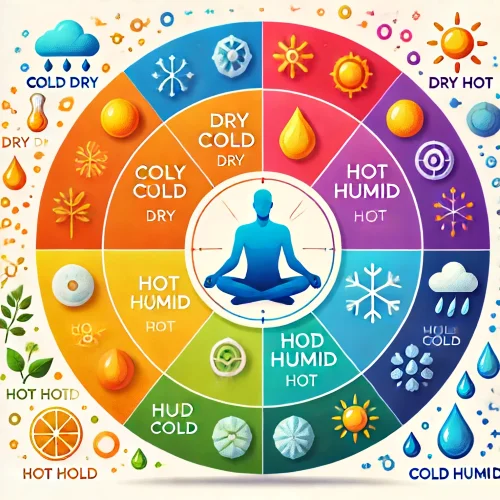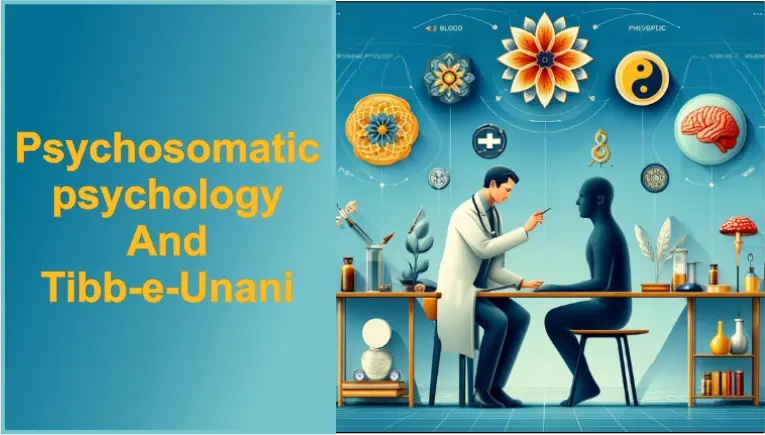Psychosomatic Psychology And Tibb-e-Unani/Eastern Medicine | SR
The relationship between psychosomatic psychology and Tibb-e-Unani,
Tibb-e-Unani, also known as Unani Medicine, is a traditional system of healing based on ancient Greek medical practices. Central to Tibb-e-Unani are temperaments, essentially the natural balances of the body’s qualities: hot, cold, dry, and humid. These temperaments influence our physical and mental health, and understanding them can help us see how our minds and bodies are connected. This concept aligns well with Psychosomatic Psychology, which studies how psychological factors affect physical health.
- Psychosomatic Psychology And Tibb-e-Unani/Eastern Medicine | SR
Tibb-e-Unani is based on several core principles:

1. Balance of Humors: The body’s health depends on the balance of four humors: blood, phlegm, yellow, and black bile. An imbalance in these humors can lead to disease.
2. Natural Healing: Treatment focuses on restoring balance through natural means, such as dietary changes, herbal remedies, and lifestyle adjustments.
3. Holistic Approach: The system considers the whole person, including physical, emotional, and environmental factors, in diagnosis and treatment.
Psychosomatic Connections in Tibb-e-Unani
Psychological Factors and Physical Health
In Tibb-e-Unani, it is well-recognized that psychological factors can significantly impact physical health. Here are some ways this connection is understood and addressed:
1. Stress and Illness: Chronic stress can disrupt the balance of humor, leading to various physical ailments such as headaches, digestive issues, and cardiovascular problems. Tibb-e-Unani treatments often include stress management techniques, such as relaxation exercises and herbal remedies to calm the mind.
2. Emotional Well-being: Emotions like anger, sadness, and anxiety can affect physical health. For instance, anger may increase heat in the body, potentially leading to inflammatory conditions. Tibb-e-Unani practitioners use therapies that address emotional health, such as counseling, meditation, and soothing herbs.
3. Mind-Body Practices: Techniques such as meditation, yoga, and deep breathing exercises are integral to Tibb-e-Unani. These practices help reduce stress, improve mental clarity, and promote overall well-being, thus preventing psychosomatic illnesses.
Psychosomatic Psychology And Eight temperaments
Understanding Each Temperament
1. Cold Dry (Melancholic)
Psychological Traits: People with this temperament tend to be serious, reflective, and sometimes sad. They are prone to feelings of depression and anxiety and often prefer solitude.
Physical Symptoms: Common issues include dry skin, constipation, and joint pain. These physical symptoms can worsen with psychological stress.
Psychosomatic Connection: Their mental state can lead to physical problems like indigestion and chronic fatigue, showing how intertwined their psychological and physical health can be.
2. Dry Cold (Melancholic Variant)
Psychological Traits: These individuals may experience mood swings, lack of motivation, and cognitive issues like poor concentration.
Physical Symptoms: Dry skin, brittle hair, and a general dryness in the mucous membranes are common. They may also feel cold more often.
Psychosomatic Connection: Mental stress can cause or exacerbate physical symptoms such as headaches and muscle stiffness.
3. Dry Hot (Choleric)
Psychological Traits: Energetic and passionate, these individuals can be prone to anger and irritability. They often act impulsively and are impatient.
Physical Symptoms: Issues include dry, warm skin, dehydration, and inflammatory conditions like rashes.
Psychosomatic Connection: High stress levels can lead to conditions like hypertension and digestive problems.
4. Hot Dry (Choleric Variant)
Psychological Traits: Assertive and ambitious, they may struggle with restlessness and relaxation.
Physical Symptoms: Prone to dehydration, heat strokes, and cardiovascular problems.
Psychosomatic Connection: Their drive for perfection and constant stress can lead to chronic issues like insomnia and heart disease.
5. Hot Humid (Sanguine)
Psychological Traits: Optimistic and social, these individuals may experience mood swings and excessive enthusiasm.
Physical Symptoms: Excessive sweating, infections, and allergic reactions are common.
Psychosomatic Connection: Social anxiety and hyperactivity can lead to physical manifestations like skin conditions and frequent infections.
6. Humid Hot (Sanguine Variant)
Psychological Traits: Creative and enthusiastic, they may also suffer from anxiety and overthinking.
Physical Symptoms: Fluid retention and respiratory and digestive problems are typical.
Psychosomatic Connection: Anxiety and stress can exacerbate physical symptoms like asthma and indigestion.
7. Humid Cold (Phlegmatic)
Psychological Traits: Calm and relaxed, but often lazy and unmotivated.
Physical Symptoms: Respiratory problems, water retention, and slow digestion.
Psychosomatic Connection: Chronic fatigue and low energy can lead to chronic bronchitis and weight gain.
8. Cold Humid (Phlegmatic Variant)
Psychological Traits: Peaceful and contemplative but prone to anxiety and social withdrawal.
Physical Symptoms: Cold, clammy skin, joint pain, and frequent colds.
Psychosomatic Connection: Anxiety and low mood can worsen conditions like arthritis and frequent infections.
Integrating Temperaments with Psychosomatic Psychology
Holistic Assessment: Practitioners should consider both mental and physical symptoms. Understanding the dominant temperament helps identify the root causes of psychosomatic conditions.
Personalized Treatment: Treatments can be tailored to balance the temperaments. For instance, a cynical person might benefit from warm, moist foods and stress-relief activities to address psychological and physical symptoms.
Lifestyle Adjustments: Encouraging lifestyle changes that promote mental well-being can help alleviate physical symptoms. Regular exercise and mindfulness practices can reduce anxiety and improve overall health.
Herbal and Dietary Remedies: herbs and dietary adjustments specific to the patient’s temperament can help balance their humor and improve mental and physical health.
Mind-Body Techniques: Incorporating mind-body techniques such as meditation, yoga, and breathing exercises can help manage stress and its physical manifestations.
By applying these principles, Tibb-e-Unani can offer a comprehensive approach to health that addresses both the mind and body. Understanding and balancing the temperaments is critical to achieving overall well-being.
Conclusion
Tibb-e-Unani provides a valuable framework for understanding the connection between our mental and physical health. By integrating these ancient principles with modern psychosomatic psychology, we can develop a holistic approach to health that addresses the whole person. This approach treats symptoms and promotes a balanced and healthy life.




